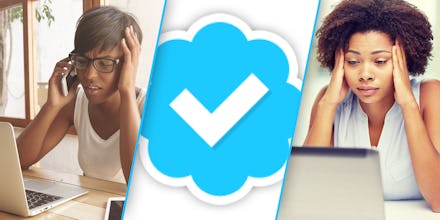Verification isn't a status symbol — it's a necessary shield against harassment

Looking for a happier, safer Twitter experience, tech essayist Jenn Frank did what many other writers have tried to do in the last few months: She applied to be verified. As the editor-at-large for Paste Games, she'd been exposed to the wrath of angry male gamers too many times to count.
Frank's verification request was ignored, despite her lengthy resume. "I told Twitter I was a Paste editor, a BAFTA nominee, the winner of the 2013 now-defunct Games Journalism Prize and a voice actress in two games," she wrote on Facebook.
As "a joke," her husband, Ted, a programmer with 2,000 followers, applied for verification after she did. He was accepted.
Without the ability to filter her mentions to verified users only — a feature available only to other verified users — Twitter was no longer a useful tool but instead an unlivable arena of harassment. Twitter "has been really demoralizing for a while now," she said in a direct message, and getting that blue "verified" checkmark represented freedom from abuse. So on Thursday, Frank said goodbye to her followers and signed off.
Frank had about 24,000 followers, and after nine years on Twitter, she wanted the ability to "filter out the trash" by narrowing down her mentions to verified accounts only.
A friend in media told her this system "might mean losing out on a lot of conversations, but he said it was totally worth it, to not have to constantly hear the endless thrum of put-downs, harassment and garbage," Frank said in a DM.
Frank finally deleted her account because Twitter wasn't a livable environment for her without verification.
"How lovely, that being famous enough, or a male programmer enough, results in better social tools," Frank tweeted. "Twitter has a clear social idea of 'haves' and 'have-nots,' and I am tired of being a have-nots according to someone else's jurisdiction."
Freedom from abuse: Frank is one of countless Twitter users who have been vocal about the need for better tools to protect people from abuse. Another is Brianna Wu, a game developer who was driven from her home amid the turmoil of Gamergate. "Anti-harassment is amazingly still not a priority for Twitter," she said in an email.
Public verification is a step forward. In the early days of the blue checkmark, it was a highly coveted status symbol. It instantly pushed you a rung up the ladder of the Twitter elite. Everyone wanted one. Users scrambled to find a Twitter contact to beg for the badge of honor. With a checkmark, you could filter out the lowly nonverified, gain more followers and simply be cooler than the rest.
And then in July, Twitter opened up verification to everyone. For Frank and many, many other women who are harassed online, verification is less about the visual caliber of a blue checkmark. It's about wielding a better weapon against trolls by simply blocking out nonverified accounts.
Twitter's steps forward: Twitter acknowledged this need for better filters last week when it opened up its quality filter setting to everyone, giving them the ability to "improve the quality of Tweets you see by using a variety of signals, such as account origin and behavior."
"The quality filter works extremely well — it's night and day for me," Wu said. "Twitter has gone from a constant garbage fire to a platform that is fun to use again. Sometimes I will log off and see the difference in my mentions, and it's shocking. I'm really happy that other women have this tool, and that's now turned on by default."
Twitter is also reportedly working on a "keyword-based tool" which would allow users to choose what they screen out, such as swear words or racial slurs, Bloomberg reported.
But as Mashable's Kerry Flynn pointed out, the quality filter is "not foolproof." Unwanted harassment is not wiped from the platform — it's simply made invisible, granted the feature is activated. And sometimes abuse still finds its way through the cracks.
Is the verification process biased? "It's very clear there's a sexist bent to who gets verified," Wu said, citing a study showing the gender breakdown of some verified accounts. "The numbers are abysmal." She added, "There are roughly twice as many men as women that are verified. Former Reddit CEO Ellen Pao was turned down for verification. Wirecutter editor-in-chief Jacqui Cheng was turned down for verification." Wu also listed Frank, "one of the most accomplished women writers in the game industry."
Twitter wouldn't disclose the team breakdown, but in its 2014 diversity report, it revealed that the team was made up of only 30% women globally. A 2015 blog post said Twitter's plans for 2016 were to increase that number to 35%.
"When men are the ones deciding what is important, that list tends to not include women," Wu said. "It's an unconscious double standard they aren't even aware of."
The company emailed a statement to Mic, saying it has "invested heavily in improving our tools and enforcement systems to better allow us to identify and take faster action on abuse as it's happening and prevent repeat offenders."
In addition, Twitter is "reviewing our policies to prohibit additional types of abusive behavior and allow more types of reporting," the statement said.
As stands, verification is one of the few anti-harassment tools at users' disposal, and many feel it should be more accessible.
"I was always under the impression that verification gave users with a lot of followers better tools for managing 'signal to noise' — but perhaps that isn't true," Frank said in a message. "I wouldn't actually know! I'll have to ask my husband to let me see his account!"
Correction: Aug. 29, 2016